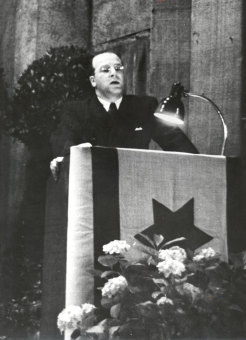Norbert Wollheim’s Character and Dedication

© Fritz Bauer Institute
Norbert Wollheim (1913–1998) led a life dedicated to service to others who lived in worse circumstances. Profoundly influenced by the ideals of the Jewish youth movement, he felt it was his duty to help his fellow man. That led him in the 1930s to become involved in the Deutsch-Jüdische Jugendgemeinschaft, the federation of German Jewish youth, and in 1938/39 he played a leading role in organizing the Kindertransporte, the transports of refugee children to England. In March 1943, Norbert Wollheim, along with his wife Rosa and their 3-year-old son, Uriel, was deported to Auschwitz, where he was sent to the Buna/Monowitz concentration camp for forced labor. His wife and son were murdered right after arrival.
Norbert Wollheim survived the forced labor at the I.G. Auschwitz construction site, and after the war he settled in Lübeck, where he became an advocate for the Displaced Persons (DPs) in the British Zone of Occupation and for the rebuilding of Jewish community life in West Germany. He testified at the I.G. Farben Trial in Nuremberg and in the Veit Harlan trial. After involvement in community work as a public figure during these years, he emigrated with his second family to the United States in 1951, as he believed that his work on behalf of the DPs was now completed and he was reluctant to see his children grow up in Germany. That same year, with the help of his attorney, Henry Ormond, Norbert Wollheim instituted his action against I.G. Farben, in which he sought compensation for withheld wages and recovery of damages.
(MN; transl. KL)
















